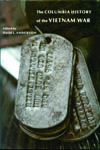 Perhaps no time since the United States signed off on its war in Vietnam 36 years ago has our understanding of that war been as critical at it seems to be today as we close in on 10 years of fighting in Afghanistan—with no discernable light shining at the end of the tunnel. Bing West, a former infantry officer in Vietnam and assistant defense secretary in the Reagan administration, calls Afghanistan the “Wrong War” and in his new book offers a strategy to get out, while taking aim at strategies such as counterinsurgency and nation building. West proclaims, “As long as we are trying to win hearts and minds, we are diverting ourselves.”
Perhaps no time since the United States signed off on its war in Vietnam 36 years ago has our understanding of that war been as critical at it seems to be today as we close in on 10 years of fighting in Afghanistan—with no discernable light shining at the end of the tunnel. Bing West, a former infantry officer in Vietnam and assistant defense secretary in the Reagan administration, calls Afghanistan the “Wrong War” and in his new book offers a strategy to get out, while taking aim at strategies such as counterinsurgency and nation building. West proclaims, “As long as we are trying to win hearts and minds, we are diverting ourselves.”
As the protracted effort to find a way to win or get out of Afghanistan rolls forward, studying similarities with the Vietnam War might help us navigate this minefield. Editor David L. Anderson has brought together in one volume a collection of 14 essays about the conflict by respected scholars with the aim of providing “a reliable historical perspective of the Vietnam War to advance accurate scholarship and sound policymaking….The assumption behind this work is that many of the historical themes in the study of the Vietnam War have contemporary relevance.”
Anderson is a professor of history at California State University, Monterey Bay, and author of Trapped by Success: The Eisenhower Administration and Vietnam and The Columbia Guide to the Vietnam War. In an expansive 80-page introduction, “The Vietnam War and Its Enduring Historical Relevance,” he offers a cogent summary of the panoply of historical analyses of the American involvement in Vietnam, and traces the origins and course of the war, all against the backdrop of decision making leading to the war against Iraq. Today with regard to Afghanistan, his conclusion bears repeating: “Local influence on a conflict will shape its course and outcome in ways that extend beyond what U.S. force and ideas, no matter how great or noble, can determine.”
The Columbia History of the Vietnam War essays are categorized into three sections. The first essays sort through chronological coverage of the war from the emergence of Vietnamese revolutionary nationalism by author Mark Philip Bradley, to Jeffrey Kimball on President Richard Nixon’s “paradoxical process” that ended U.S. intervention. The second group of essays are topical, including separate examinations of military strategies by John Prados and Eric Bergerud. The war’s legacy is the subject of the final section, with analyses by Robert D. Schulzinger and George Herring.
With its sterling lineup of scholars, The Columbia History provides keen insights into the history of the war in Vietnam that are accessible to a broad readership and informative as we grapple with current wars.
Columbia University Press, 2011




